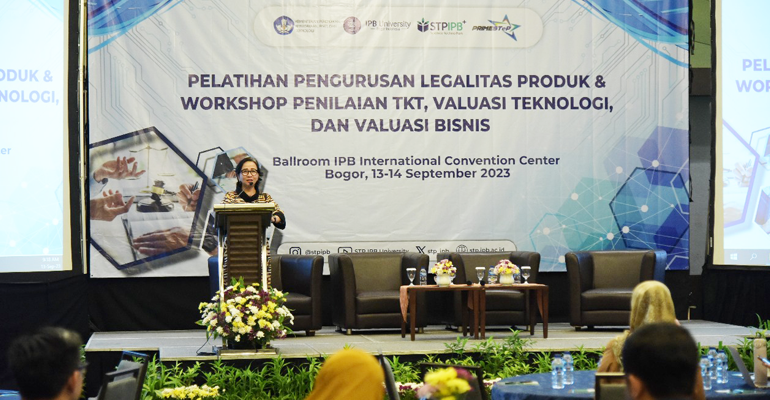Prepare Innovative Products for National and Global Markets, IPB University’s LKST Conducts Product Legality Management Training

The Institute of Science and Technology (LKST) at IPB University has organized a training program on Product Legality Management and a workshop on Technology Readiness Assessment (TKT), Technology Valuation and Business Valuation. This training is aimed at assisting innovators and startups in developing their inventions into innovations that can be commercialized, both domestically and internationally.
In the process of downstream and commercialization of innovative products, there are often stages that researchers are not familiar with. These stages include technology valuation, determining the percentage of technology readiness required to transform research results from inventions into innovations.
One of the trainers for this program is Pro Ratih Dewanti Hariyadi, who has expertise in the field of food microbiology and has been providing food safety training for 25 years.
Prof Erika B Laconi, the Chairman of LKST at IPB University, emphasized that it is their responsibility to guide research inventions into innovative products that are ready to benefit society, even though it is not an easy task.
“In this training, there are 6 startups and 20 innovation teams participating in the Primestep program for 2023. The goal is to commercialize innovative products not only domestically but also internationally,” she explained.
Out of the 20 products, she continued, one example of an IPB University innovation product that has gone international is “tempe Azzaki,” which has entered the Tokyo, Japan market. In fact, Prof. Erika mentioned that it sold out within hours. The same goes for the other 19 innovative products. Through the Primestep program until 2027, IPB University’s LKST will continue to assist in promoting innovations from their community to penetrate international markets.
“Currently, 36 percent of innovations are ready for collaboration with industries or startups,” added Prof Erika.
Furthermore, she emphasized three key points often highlighted in the efforts to obtain product approval: quality, compliance with regulations, and timeliness. Regarding the first point, she stressed that IPB University’s innovative products must meet quality standards. Additionally, it is important to consider the aspects of halal and food safety.
“Compliance with regulations is crucial because it has become a national issue that the implementation of downstream commercialization of innovative products by universities is hindered by product approvals. Innovative products also need to be timely in accordance with consumer needs,” she concluded. (dh/Rz) (IAAS/DSR)



